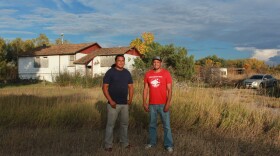SCOTT SIMON, HOST:
Greece votes tomorrow in what's being described as the most unpredictable election in years, three months after the country's deadliest train crash in which 57 people died, many of them students. Reporter Lydia Emmanouilidou joins us now from Athens.
Lydia, thanks so much for being with us.
LYDIA EMMANOUILIDOU: Thanks for having me, Scott.
SIMON: How does this train crash become an issue in the election?
EMMANOUILIDOU: Well, the political backlash after the train crash in late February was massive. It sparked huge protests, as you said, especially among young people. But really across the board, there was so much outrage among Greeks who blamed the country's political establishment for the safety failures that led to the accident. People called on the Greek Prime minister, Kyriakos Mitsotakis, to resign. He did not. He's running for reelection. His conservative New Democracy party, though, did see its lead in the polls narrow.
And the left-wing opposition party, Syriza, which is headed by the former Greek prime minister Alexis Tsipras, is trailing only a few points behind. And then there are some smaller parties on the far right and the far left that have gained some ground. This, coupled with new election rules this year, means that there's probably not going to be an outright winner in this round of elections. A second round is preliminarily penciled in for July.
SIMON: Greece, of course, is at the center of the eurozone economic crisis 14 years ago. The economy is better now. How much are economic issues at the center of these elections?
EMMANOUILIDOU: Yeah. Well, inflation and the economy are the top concerns for people in this country, according to polls. Many Greeks are not able to keep up with soaring food costs and with energy bills that skyrocketed after Russia's invasion of Ukraine. And according to official figures, a good portion of Greeks are at risk of poverty. Greece's economy, though, has come a long way over the past decade, and the Greek prime minister can take some credit for that. He's brought in foreign investment, cut corporate taxes, and we've seen unemployment rates dropping, GDP growing and the minimum wage and pensions. And the prime minister says that if he's reelected, there's more economic growth on the way.
SIMON: Given all this measurable progress, why are the elections so close?
EMMANOUILIDOU: Well, even though there has been economic progress, the prime minister's critics say there's also been some backsliding, that there are some issues that threaten the rule of law. One issue is this long-brewing spying scandal that the prime minister has been at the center of. He and his government are accused of using spyware to monitor journalists and political opponents. Also, media freedom in the country has declined, according to monitoring groups. In fact, the annual index by the nonprofit Reporters Without Borders - it ranks Greece dead last in the EU for media freedom. And finally, this administration is accused of illegal and violent returns of migrants who tried to cross into Greece through neighboring Turkey. The government has long denied so-called pushbacks, but evidence that they're happening systematically is mounting.
Now, I can't say whether the prime minister's party will lose votes over these issues. It's possible that the hard-line policies at the border, for example, will actually win over some voters on the right. But this is the cloud of issues hanging over this election less than a day before polls open here in Greece.
SIMON: Lydia Emmanouilidou in Athens. Thanks so much.
EMMANOUILIDOU: Thank you, Scott. Transcript provided by NPR, Copyright NPR.
NPR transcripts are created on a rush deadline by an NPR contractor. This text may not be in its final form and may be updated or revised in the future. Accuracy and availability may vary. The authoritative record of NPR’s programming is the audio record.







